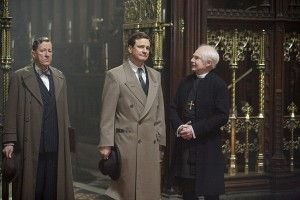 For EpiscopalCafe.com’s Daily Episcopalian:
For EpiscopalCafe.com’s Daily Episcopalian:
Finally, finally, FINALLY, I went to see The King’s Speech.
I did not see this movie because of the cast – although Colin Firth and Helena Bonham Carter and Geoffrey Rush all do magnificent jobs.
I did not see it because it is nominated for awards everywhere.
I saw this movie because as a child, I, too, had a speech impediment, and from one line I head in an NPR interview with director Tom Hooper – the King yelling, in Westminster Abbey, “I have a voice!” – I knew this movie was telling part of my story as well.
Unlike King George VI, I did not stutter. I had a lisp. It was an awful lisp some days, which I had until I was in seventh grade, and for which I was made fun of by classmates and playmates and even my siblings at times.
When the NPR interview last November began, I wondered: “A movie about the King of England during World War II? He had a speech impediment? Really? I thought he lifted up his people with all kinds of speeches on the radio?” I knew that George VI wasn’t supposed to be king, that his brother David abdicated the throne to marry Wallis Simpson, and that as king, George inspired his people.
He had a stutter?
And then I heard that powerful line – “I have a voice!” – and shivers went down my spine and I thought, “I HAVE to see this movie!”
I had to see it because I remember thinking, in my childhood, when people where making fun of me, “Just because I lisp doesn’t mean I can’t speak. Listen to me!”
The lisp was the result of losing my two front teeth when I was 2. I was in a car accident, caused, I’m told, by a drunken driver who ran a red light and plowed into our station wagon. It was back in the early ‘60s, when no one thought to put their children in car seats, and seat belts weren’t a huge priority. I was, I’m told, standing on the back seat, clinging to the front bench seat and doing what 2-year-olds do: goofing off. When our car was hit, my mother told me, I flew into the nice metal strip that was on the back of all bench seats in station wagons in those days (don’t ask me why they were there … they just were).
Now these were my baby teeth that I lost; my adult teeth weren’t due in for years. We didn’t do implants in those days (again, don’t ask me why) or spacers. So what happened?
I spent the next four years without my front teeth. Which meant that I had problems whistling (this was huge in my family), and I developed a nice, pronounced lisp. It was so pronounced that at times, my stepfather would joke about taking me down to the woodshop in the basement and fitting me with wooden teeth, like George Washington supposedly had (I learned later that his teeth were made from hippopotamus ivory). That threat used to scare the bejesus out of me.
And then there was the jealousy factor: one of my older brothers got to sing All I Want for Christmas is My Two Front Teeth when he was in first grade. But he HAD his front teeth, so it had no meaning for him. Me? I was soooo excited about getting to sing that as well … until my front teeth finally came in just weeks before it was my turn, and the song lost its significance.
But the coming of new teeth did not end the lisp. It hung in there for years, until at last, my mother put me in speech therapy. I had to do “exercises” involving strings and small weights, and others pronouncing letters and sounds, and every day, I literally had think about my tongue and where it was positioned in my mouth, not just when I was speaking but also when I first woke up … when I was watching TV … when I was sitting in class. I had a little notebook and had to record, with smiley faces and frowns, where I found my tongue at any given moment. (To this day, I still catch myself checking my tongue placement.)
When my friends found out what I was doing, they made even more fun of me. I was mortified on the playground at school when I found some of them imitating my therapy exercises. I’ll never get over this, I used to think. Never!
But all those exercises paid off. Within a year, I was lisp-free. And when I conquered that lisp, I truly found my voice. I no longer had to worry about what I would sound like when I was speaking. Instead, I could concentrate on what I was saying.
Now, to be honest, I haven’t thought about the days of my lisp in years. I’m a public speaker now; anyone who knows me will tell you that I’ll preach the Gospel at the drop of a hat, and that getting me to shut up can be very hard indeed. For me, my lisp was a thing of the long-ago and forgotten past.
Until I heard that one line – that powerful, spine-tingling scream from the movie – and all of my frustrations and fears and tears came back, and I realized: I have to see this movie!
Not to relive those frustrations and fears and tears, but to see this message that yes, we DO each have a voice, and yes, our voices, individually and corporately, ARE important.
God gives each of us that voice, and God wants to hear it. God wants us to raise our voices to the heavens, to proclaim God’s love and glorify God’s name and strengthen and inspire God’s people and, yes, to tell our stories.
Even when we stutter.
Even when we lisp.
The Rev. Lauren R. Stanley is a priest of the Diocese of Virginia and church consultant who served for five years as an overseas missionary.





